5 Sep 2014 | Azerbaijan, Azerbaijan News, News and features
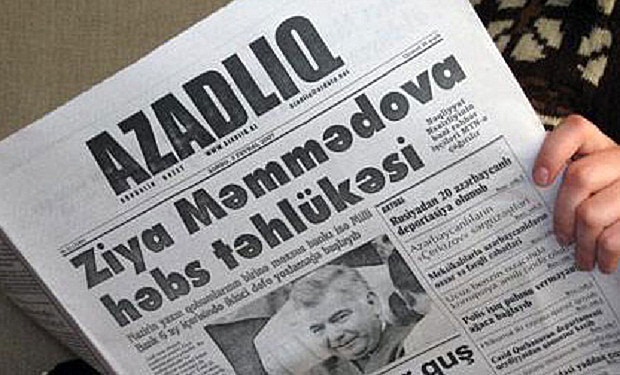
Seymur Hezi, a reporter working for Azadliq, Azerbaijan’s last independent newspaper, was sentenced to a two month pretrial detention on Monday, charged with disorderly conduct. This morning, journalist Khadija Ismayilova was detained at the Baku airport, according to the Institute for Reporters’ Freedom and Safety (IRFS).
Hezi’s arrest is another sign of the continuing clampdown by Azerbaijan’s authoritarian government on civil society. The journalist was charged with an alleged attack on a person in the street, although his lawyers claim he was trying to protect himself after he had been harassed and attacked.
It is not the first time charges of hooliganism and disorderly conduct have been applied against opposition politicians, civil society activists and journalists in Azerbaijan. In previous years, the same charges were used to imprison critical journalists Sardar Alibeili and Ganimat Zahid as well as bloggers Emin Milli and Adnan Hajizadeh.
“Seymur Hezi’s arrest is a serious blow against our newspaper. He is one of the brightest Azerbaijani analysts and journalists, and a true intellectual,” Rahim Haciyev, acting editor of Azadliq newspaper, told Index.
Haciyev said he is sure Hezi’s arrest is the result of a planned provocation and the journalist is prosecuted for publishing critical articles on the authorities in the newspaper, as well as in his online TV program “Azerbaijani Hour”, which he scripts and hosts.
The journalist’s arrest came only a month after the newspaper he works for, Azadliq, was forced into suspension of publication due to financial pressure from the authorities. Now it exists only in its online version.
The authorities of Azerbaijan continue their clampdown on the civil society of the country. Well-know human rights defenders Rasul Jafarov, Intigam Aliyev, Leyla Yunus and her husband Arif Yunus are still behind bars after they were all sentenced to 3 months of pretrial detention. The office of the Institute for Reporters’ Freedom and Safety (IRFS) was searched and sealed.
This wave of repression is connected to new legislation in place in Azerbaijan that restricts the freedom of association. In fact the new law makes it illegal for unregistered civil society organisations to receive funds for their activities.
This article was posted on 5 Sept 2014 at indexoncensorship.org
30 Jul 2014 | Azerbaijan, Azerbaijan News, News and features
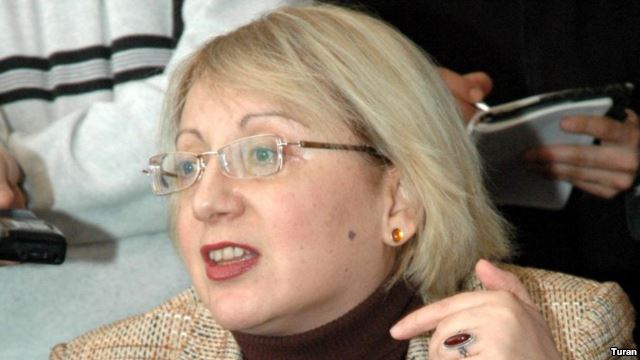
UPDATE 30 July 17:30 pm
Leyla Yunus has been charged with “high treason (article 274), tax evasion (article 213), illegal entrepreneurship (article 192), forged documentation (article 320) and fraud (article 178.3.2)”, reports Meydan TV. She has also been given three months of pre-trial detention, according to Azerbaijani journalist Khadija Ismayilova. Her husband Arif Yunus is reportedly facing two charges; state betrayal (article 274) and fraud.
—
Azerbaijani human rights activist Leyla Yunus has been taken to the prosecutor’s office in Baku for questioning, local media reported.
While on her way to a conference this morning, three men entered her taxi and confiscated her and her driver’s mobile phones. According to her husband Arif Yunus, she is not allowed to see her lawyer.
“It is likely [they] are going to try and arrest her as part of Mirkadirov’s case. It is also likely I too will be arrested,” he told BBC Azerbaijan. He was referring to the case of journalist Rauf Mirkadirov, who was arrested in April and charged with espionage, believed to be linked to his contact with Armenian civil society. Leyla Yunus has spoken out in support of him. Mr. Yunus also said people were trying to break into the couple’s apartment this morning.
Leyla Yunus is the director of the Peace and Democracy Institute, which among other things works to establish rule of law in Azerbaijan. She has previously been targeted by authorities, including in April, when she and her husband were detained when trying to board a flight from Baku to Doha, Qatar. Azerbaijan has a notably poor record on human rights and civil liberties. According to recent figures, there are a 142 political prisoners in the country.
This article was posted on July 30, 2014 at indexoncensorship.org
8 May 2014 | Azerbaijan, Azerbaijan News, Europe and Central Asia, News and features
This week eight young Azerbaijani activists were sentenced to between six and eight years in jail. The members of the N!DA Youth Movement, which works for democracy and social change, were convicted for possession of drugs and explosives, and for intending to “cause public disorder”. The charges are widely believed to be trumped up, and the trials have been criticised by foreign observers over “irregularities” and “shortcomings”, including inconsistencies in testimonies and mishandling of evidence.
This is just the latest addition to a long list of human rights abuses by authorities in the oil rich country. As the repression has largely been allowed to take place away from international attention, this is a good moment to remember a few things about Azerbaijan, especially as the country prepares to take over a six month chairmanship of the Council of Europe’s Committee of Ministers.
1) The six are far from the only political prisoners in Azerbaijan
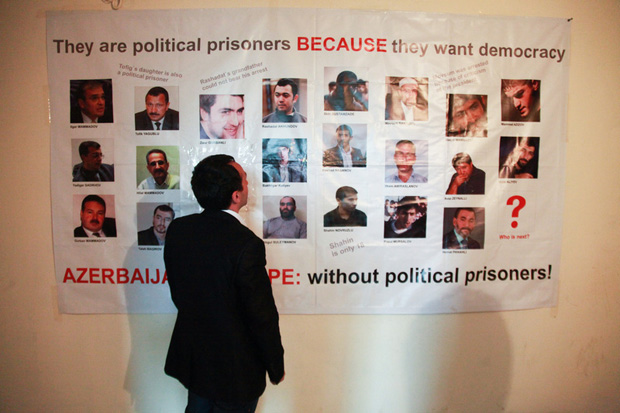
(Image: Aziz Karimov)
According to the latest figures, there are 142 political prisoners in Azerbaijan today. These include human rights defenders, youth activists, and a large number of religious activists, among others. There are currently 17 people serving life sentences. Ahead of the country’s presidential election last October, candidate Ilgar Mammadov was arrested. In March, he was sentenced to seven years in prison for “organizing mass disturbances” and “resisting the police”. Meanwhile, President Ilham Aliyev insists that there are no political prisoners in Azerbaijan.
2) You may escape imprisonment, but you could still face violence and intimidation
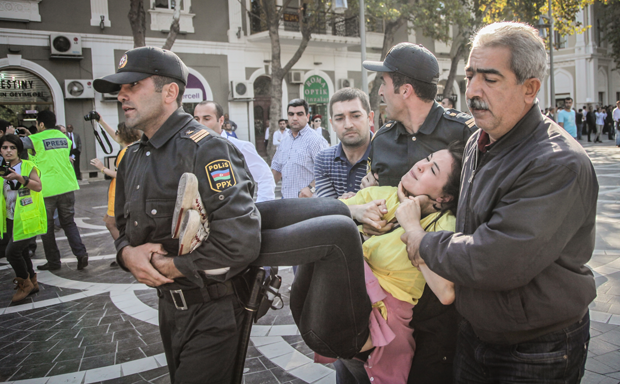
(Image: Aziz Karimov)
Attacks, threats and intimidation are regular occurrences for political opponents, activists and press in Azerbaijan. Following protests in the capital Baku as Aliyev secured his third consecutive term in power last October, demonstrators were beaten and detained by police. Police also raided the offices of independent Election Monitoring and Democracy Studies Centre (EMDSC) which reported irregularities in the election. In 2012, reporter Idrak Abbasov was brutally beaten when filming the demolition of a house by the State Oil Company of Azerbaijan, allegedly by employees of the company and police. The same year, fellow journalist Khadija Ismayilova, known for covering corruption among the country’s powerful elite, was blackmailed with intimate images of her and her boyfriend. She continues to face intimidation today. These abuses are often allowed to happen with impunity.
3) Independent and critical media are under threat

(Image: Alex Brenner for Index on Censorship)
Azerbaijan’s critical press have long been subjected to an array of attacks. Independent news outlets face economic sanctions, and are often barred from distribution networks. Some 70% of distribution is controlled by the government. Most of the nine national TV channels are either directly owned by the state or controlled by the authorities. Journalists also fall victim to legal threats. In the first six months of 2013, 36 defamation suits were brought against media outlets or journalists, four of which were criminal defamation suits. One victim of this hugely restrictive media environment is leading independent paper and Index Award winner Azadliq. The paper has been hit with £52,000 worth of fines following defamation suits, state-owned press distribution company Gasid has not been transferring payments that reflect the paper’s sales. Azadliq claims Gasid owe them some £44,000.
4) Authorities are on an ongoing PR mission

(Image: Zeljko Joksimovic/Wikimedia Commons)
While the situation inside the country shifts between bad and worse, authorities have focused their attentions on a wide-reaching international PR campaign. Ahead of hosting the Eurovision Song Contest, authorities ordered urban renewal that saw houses demolished and families evicted. Vast sums have in recent years been poured into the radical regeneration and beautification of Baku, and there’s more to come. There is also the posh London bar Baku, owned by the Aliyevs; the glossy, internationally distributed Baku magazine, edited by first daughter Leyla and co-published by Conde Nast; and the sponsorship deal with Champions League finalists Atlético Madrid. Next year, Baku will again play host to a prestigious international event — the inaugural European Games.
5) They are about to take charge of one of Europe’s most important human rights bodies
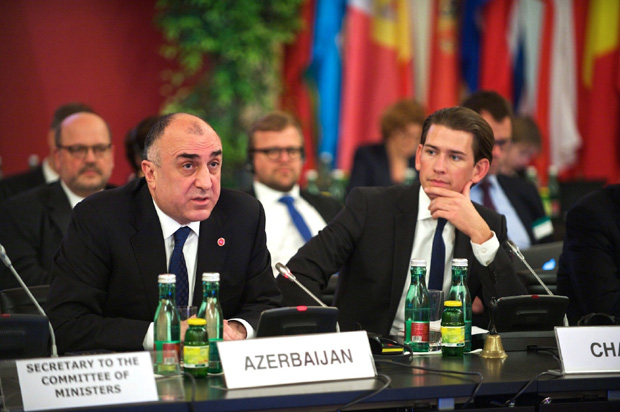
(Image: Sandro Weltin/Council of Europe)
“The Committee of Ministers supervises the execution of judgments of the European Court of Human Rights the Council of Europe…The Committee of Ministers’ essential function is to ensure that member states comply with the judgments and certain decisions of the European Court of Human Rights,” the Council of Europe declare on their website. Next week Azerbaijan will assume the chairmanship of this very Committee of Ministers. But one could say that COE is only sticking to form in its relationship with the country. Only last year, a majority in its Parliamentary Assembly (PACE) voted down a resolution on the existence of political prisoners in Azerbaijan.
This article was originally published on 8 May 2014 at indexoncensorship.org
8 Mar 2014 | Azerbaijan News, News and features
International Women’s Day is a day to remember violence against women, the education gap, the wage gap, online harassment, everyday sexism, the intersection between sexism and other -isms, and a whole host of other issues to make us realise we’ve still got a long way to go. A day to demand continued progress, and a day to pledge to work to achieve it.
But it is also a day to celebrate. To appreciate the fantastic achievements that are made every day, everywhere, by women from all walks of life. It’s a day to be grateful to the women who dedicate their lives to fighting on the front lines to protect rights vital to us all. We want to shine the spotlight on women who have stood up for freedom of expression when it’s not the easy or popular thing to do, against fierce opposition and often at great personal risk. The following eight women have done just that. We know there are many, many more. Tell us about your female free speech hero in the comments or tweet us @IndexCensorship.
Meltem Arikan — Turkey
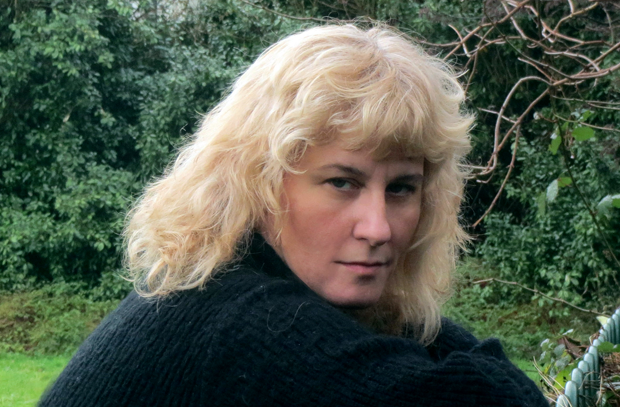
Meltem Arikan
Arikan is a writer who has long used her work to challenge patriarchal structures in society. He latest play “Mi Minor” was staged in Istanbul from December 2012 to April 2013, and told the story of a pianist who used social media to challenge the regime. Only a few months after, the Gezi Park protests broke out in Turkey. What started as an environmental demonstration quickly turned into a platform for the public to express their general dissatisfaction with the authorities — and social media played a huge role. Arikan was one of many to join in the Gezi Park movement, and has written a powerful personal account of her experiences. But a prominent name in Turkey, she was accused of being an organiser behind the protests, and faced a torrent of online abuse from government supporters. She was forced to flee, now living in exile in the UK.
I realised that we were surrounded, imprisoned in our own home and prevented from expressing ourselves freely.
Anabel Hernández — Mexico

Anabel Hernández (Image: YouTube)
Hernández is a Mexican journalist known for her investigative reporting on the links between the country’s notorious drug cartels, government officials and the police. Following the publication of her book Los Señores del Narco (Narcoland), she received so many death threats that she was assigned round-the-clock protection. She can tell of opening the door to her home only to find a decapitated animal in front of her. Before Christmas, armed men arrived in her neighbourhood, disabled the security cameras and went to several houses looking for her. She was not at home, but one of her bodyguards was attacked and it was made clear that the visit — from people first identifying themselves as members of the police, then as Zetas — was because of her writing.
Many of these murders of my colleagues have been hidden away, surrounded by silence – they received a threat, and told no one; no one knew what was happening…We have to make these threats public. We have to challenge the authorities to protect our press by making every threat public – so they have no excuse.
Amira Osman — Sudan
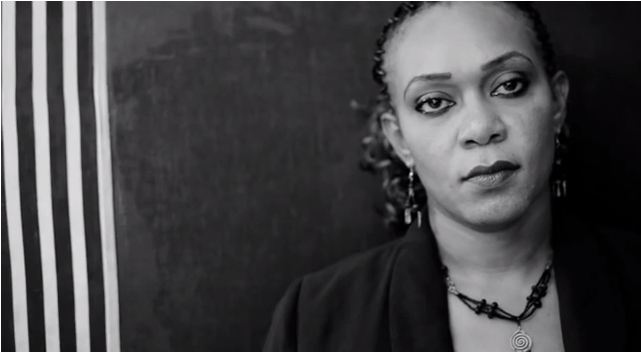
Amira Osman (Image: YouTube)
Amira Osman, a Sudanese engineer and women’s rights activist was last year arrested under the country’s draconian public order act, for refusing to pull up her headscarf. She was tried for “indecent conduct” under Article 152 of the Sudanese penal code, an offence potentially punishable by flogging. Osman used her case raise awareness around the problems of the public order law. She recorded a powerful video, calling on people to join her at the courthouse, and “put the Public Order Law on trial”. Her legal team has challenged the constitutionality of the law, and the trial as been postponed for the time being.
This case is not my own, it is a cause of all the Sudanese people who are being humiliated in their country, and their sisters, mothers, daughters, and colleagues are being flogged.
Fadiamata Walet Oumar — Mali
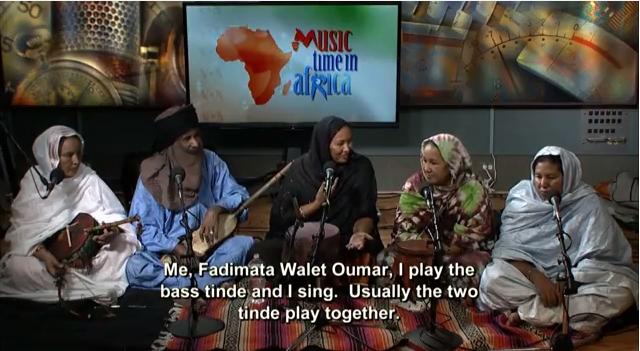
Fadiamata Walet Oumar with her band Tartit (Image: YouTube)
Fadiamata Walet Oumar is a Tuareg musician from Mali. She is the lead singer and founder of Tartit, the most famous band in the world performing traditional Tuareg music. The group work to preserve a culture threatened by the conflict and instability in northern Mali. Ansar Dine, an islamists rebel group, has imposed one of the most extreme interpretations of sharia law in the areas they control, including a music ban. Oumar believes this is because news and information is being disseminated through music. She fled to a refugee camp in Burkina Faso, where she has continued performing — taking care to hide her identity, so family in Mali would not be targeted over it. She also works with an organisation promoting women’s rights.
Music plays an important role in the life of Tuareg women. Our music gives women liberty…Freedom of expression is the most important thing in the world, and music is a part of freedom. If we don’t have freedom of expression, how can you genuinely have music?
Khadija Ismayilova — Azerbaijan

Khadija Ismayilova
Ismayilova is an award-winning Azerbaijani journalist, working with Radio Free Europe/Radio Liberty. She is know for her investigative reporting on corruption connected to the country’s president Ilham Aliyev. Azerbaijan has a notoriously poor record on human rights, including press freedom, and Ismayilova has been repeatedly targeted over her work. She was blackmailed with images of an intimate nature of her and her boyfriend, with the message to stop “behaving improperly”. This February, she was taken in for questioning by the general prosecutor several times, accused of handing over state secrets because she had met with visitors from the US Senate. In light of this, she posted a powerful message on her Facebook profile, pleading for international support in the event of he arrest.
WHEN MY CASE IS CONCERNED, if you can, please support by standing for freedom of speech and freedom of privacy in this country as loudly as possible. Otherwise, I rather prefer you not to act at all.
Jillian York — US
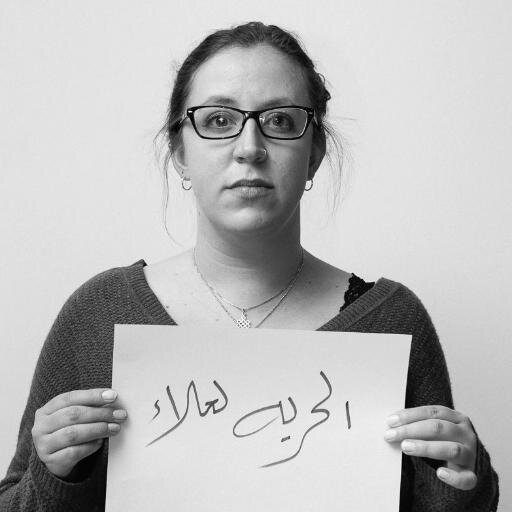
Jillian York (Image: Jillian C. York/Twitter)
Jillian York is a writer and activist, and Director of Freedom of Expression at the Electronic Frontier Foundation (EFF). She is a passionate advocate of freedom of expression in the digital age, and has spoken and written extensively on the topic. She is also a fierce critic of the mass surveillance undertaken by the NSA and other governments and government agencies. The EFF was one of the early organisers of The Day We Fight Back, a recent world-wide online campaign calling for new laws to curtail mass surveillance.
Dissent is an essential element to a free society and mass surveillance without due process — whether undertaken by the government of Bahrain, Russia, the US, or anywhere in between — threatens to stifle and smother that dissent, leaving in its wake a populace cowed by fear.
Cao Shunli — China
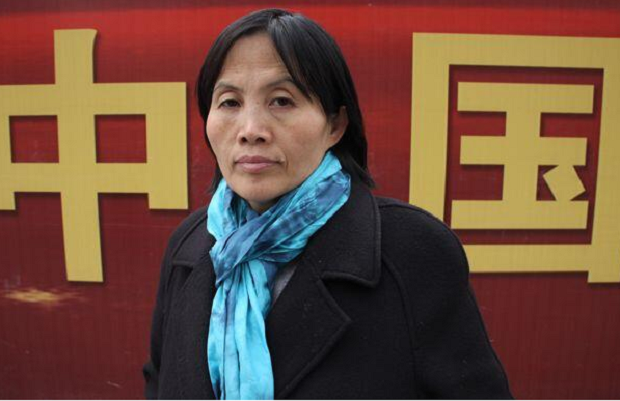
Cao Shunli (Image: Pablo M. Díez/Twitter)
Shunli is an human rights activist who has long campaigned for the right to increased citizens input into China’s Universal Periodic Review — the UN review of a country’s human rights record — and other human rights reports. Among other things, she took part in a two-month sit-in outside the Foreign Ministry. She has been targeted by authorities on a number of occasions over her activism, including being sent to a labour camp on at least two occasions. In September, she went missing after authorities stopped her from attending a human rights conference in Geneva. Only in October was she formally arrested, and charged for “picking quarrels and promoting troubles”. She has been detained ever since. The latest news is that she is seriously ill, and being denied medical treatment.
The SHRAP [State Human Rights Action Plan, released in 2012] hasn’t reached the UN standard to include vulnerable groups. The SHRAP also has avoided sensitive issue of human rights in China. It is actually to support the suppression of petitions, and to encourage corruption.
Zainab Al Khawaja — Bahrain
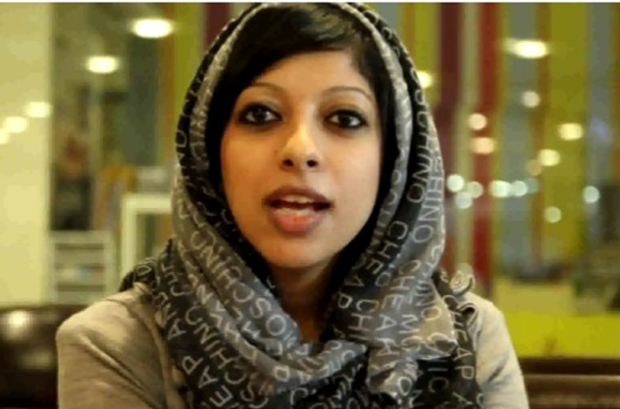
Zainab Al Khawaja
Al Khawaja is a Bahraini human rights activist, who is one of the leading figures in the Gulf kingdom’s ongoing pro-democracy movement. She has brought international attention to human rights abuses and repression by the ruling royal family, among other things, through her Twitter account. She has also taken part in a number of protests, once being shot at close range with tear gas. Al Khawaja has been detained several times over the last few years, over “crimes” like allegedly tearing up a photo of King Hamad bin Isa Al Khalifa. She had been in jail for nearly a year when she was released in February, but she still faces trials over charges like “insulting a police officer”. She is the daughter of prominent human rights defender Abdulhadi Al Khawaja, who is currently serving a life sentence.
Being a political prisoner in Bahrain, I try to find a way to fight from within the fortress of the enemy, as Mandela describes it. Not long after I was placed in a cell with fourteen people—two of whom are convicted murderers—I was handed the orange prison uniform. I knew I could not wear the uniform without having to swallow a little of my dignity. Refusing to wear the convicts’ clothes because I have not committed a crime, that was my small version of civil disobedience.
This article was posted on March 8, 2014 at indexoncensorship.org















